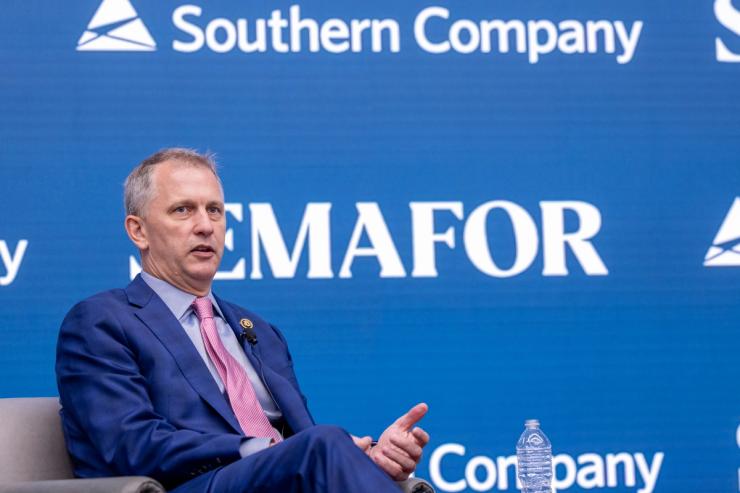The News
Illinois Democratic congressman Sean Casten indicated he’s open to a fall debate on overhauling US permitting laws to expedite clean energy projects in an interview with Semafor’s Elana Schor Tuesday.
“It is vastly easier to build a gas pipeline in this country than a transmission line,” Rep. Casten stressed, speaking at Semafor’s Powering the Next Generation of American Energy event in Washington, DC.
Rep. Casten is the chief co-author of a permitting reform proposal in the House that’s similar, but not identical, to a Senate proposal from Independent Joe Manchin of West Virginia and Republican John Barrasso of Wyoming. While it’s unclear how big lawmakers’ appetite will be to tackle permitting reform before the next president takes office, given the little time Congress has left in session, Casten said he’s up for continuing talks in the so-called lame duck session that will start after Election Day.
“At this point it is really a lame duck conversation, and I should give Senator Manchin credit, if somewhat begrudgingly,” he said.
Casten also touted President Joe Biden’s Inflation Reduction Act, pointing out that it had fostered clean energy projects and created jobs. But he also criticized elements of both his own party’s and Republicans’ climate messaging, calling for better public communication on clean energy costs and reliability.
“We often fail by thinking that convincing voters to care about climate is about talking up the things we care about, instead of translating climate into the language that matters to them — like healthcare, reliability, and costs,” he said.
Also speaking at the Semafor event, US Department of Energy director of grid deployment Maria Robinson said that efforts to streamline current permitting processes are ongoing but declined to comment on any further changes, stating she would not “get ahead of the White House.”
“We’re trying to make sure that we are not letting the federal government get in the way of any sort of permitting reforms,” Robinson said.
Know More
A hurdle to new energy infrastructure highlighted by multiple speakers at Tuesday’s event was the age and limitations of the US grid.
“The vast majority of the electric grid is over 75 years old. If we treated our roads and bridges like that, what would you expect the number of potholes to be? We still need to invest more,” Robinson said.
Upgrading it requires streamlined federal regulations that balance the needs of large utilities and smaller entities, she added. “If the current process had been streamlined over the past 10 years, we would have seen 66 years of bureaucracy shaved off,” she said.
Alabama-based nuclear power company Southern Nuclear’s senior vice president John Williams said building more resilience into the US’ energy infrastructure should include more diverse energy sources, including nuclear. Williams added that it behooves companies to diversify their portfolios, too.
“Southern Company has long had an ‘all of the above’ approach to energy. We’re adding renewables, battery storage, and also pursuing carbon capture,” he said. “We want to ensure clean, reliable, affordable energy for our customers.”
Chip Palombini, who is the head of the charging and infrastructure team at electric aerospace company Beta Technologies, said that new infrastructure should come alongside financial incentives to support clean tech companies. “The speed at which the industry is progressing is far ahead of what most people expect,” Palombini said.
“Every new airport we go to has a different approval process. There’s a need for consistency in deploying funds and permitting for electric aviation infrastructure, just as we have for electric vehicles,” he added.


